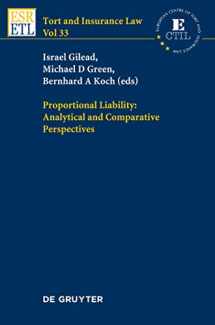
Proportional Liability: Analytical and Comparative Perspectives (Tort and Insurance Law, 33)
ISBN-13:
9783110282535
ISBN-10:
3110282534
Edition:
1
Author:
Michael D. Green, Bernhard A. Koch, Israel Gilead
Publication date:
2013
Publisher:
De Gruyter
Format:
Hardcover
396 pages
FREE US shipping
Book details
ISBN-13:
9783110282535
ISBN-10:
3110282534
Edition:
1
Author:
Michael D. Green, Bernhard A. Koch, Israel Gilead
Publication date:
2013
Publisher:
De Gruyter
Format:
Hardcover
396 pages
Summary
Proportional Liability: Analytical and Comparative Perspectives (Tort and Insurance Law, 33) (ISBN-13: 9783110282535 and ISBN-10: 3110282534), written by authors
Michael D. Green, Bernhard A. Koch, Israel Gilead, was published by De Gruyter in 2013.
With an overall rating of 3.8 stars, it's a notable title among other
books. You can easily purchase or rent Proportional Liability: Analytical and Comparative Perspectives (Tort and Insurance Law, 33) (Hardcover) from BooksRun,
along with many other new and used
books
and textbooks.
And, if you're looking to sell your copy, our current buyback offer is $0.41.
Description
Causal uncertainty is a wide-spread phenomenon. Courts are often unable to determine whether a defendant´s tortious conduct was a factual cause of a plaintiff´s harm. Yet, sometimes courts can determine the probability that the defendant caused the plaintiff´s harm, although often there is considerable variance in the probability estimate based on the available evidence. The conventional way to cope with this uncertainty has been to apply the evidentiary rule of ´;standard of proof´. The application of this ´;all or nothing´ rule can lead to unfairness by absolving defendants who acted tortiously and may also create undesirable incentives that result in greater wrongful conduct and injustice to victims. Some courts have decided that this ´;no-liability´ outcome is undesirable. They have adopted rules of proportional liability that compensate plaintiffs according to the probability that their harm was caused by the defendant´s tortious conduct. In 2005 the Principles of European Tort Law (PETL) made a breakthrough in this regard by embracing rules of proportional liability. This project, building on PETL, endeavours to make further inquiries into the desirable scope of proportional liability and to offer a more detailed view of its meaning, implications, and ramifications.


We would LOVE it if you could help us and other readers by reviewing the book
Book review

Congratulations! We have received your book review.
{user}
{createdAt}
by {truncated_author}


